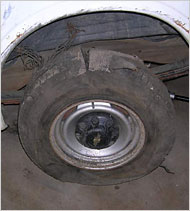Chinese Tires Are Ordered Recalled
 Tread separation is the same defect that led to the recall of millions of Firestone tires in 2000. At the time, tire failure was linked to an increased risk of rollover of light trucks and S.U.V.’s.
Tread separation is the same defect that led to the recall of millions of Firestone tires in 2000. At the time, tire failure was linked to an increased risk of rollover of light trucks and S.U.V.’s.The company, Foreign Tire Sales of Union, N.J., had originally sought the federal government’s help with a recall, saying it did not have enough money to recall all the tires itself. Typically, importers are responsible for the cost of recalling defective foreign products.
But officials at the National Highway Traffic Safety Administration said it remained the responsibility of Foreign Tire Sales to pay for the costs of the recall, said Heather Hopkins, a spokeswoman for the agency. She said the agency wanted “a full tire recall” by the company.
The defective tires join a growing list of problematic products with origins in China. A huge recall of potentially tainted pet food in March was followed by widespread reports of toothpaste manufactured with a toxic chemical and toys coated with lead paint.
Ms. Hopkins said the agency’s top officials were “outraged” that Foreign Tire Sales’ executives waited more than two years to pass on their suspicions about problems with the tires. The company first suspected problems in October 2005. Almost a year later, in September 2006, the Chinese manufacturer, Hangzhou Zhongce Rubber, a former state-owned company based in eastern China, acknowledged that a gum strip that prevents the tread from separating was left out of the manufacturing process.
Lawrence N. Lavigne, a lawyer for Foreign Tire Sales, said the company did not alert the National Highway Traffic Safety Administration about the problems until June 11 because officials had no definitive proof of a manufacturing flaw until it was revealed by further testing in May. He said it made no sense to initiate a recall based on suspicions.
Jeffrey B. Killino, a personal-injury lawyer from Philadelphia, said the company came forward only after it was named as a defendant in a lawsuit, filed in May, involving an accident in which two construction workers were killed and a third was severely injured when a van rolled over. The lawsuit contended that the accident was caused by tread separation in a Hangzhou Zhongce tire.
Earlier, an ambulance in New Mexico rolled over after a Hangzhou Zhongce tire came apart, though there were no significant injuries, according to documents supplied by Foreign Tire Sales to the federal safety agency.
An official at Hangzhou Zhongce Rubber, reached late Monday, declined to comment. The defective tires are sold under the brand names Westlake, Compass, Telluride and YKS, Mr. Lavigne said.
Tire separation led to a much larger recall in 2000. Firestone recalled 6.5 million tires after at least 271 people were killed and hundreds more injured in accidents involving its tires coming apart.
It is not clear how many defective tires might be on the road.
Hangzhou Zhongce has refused to tell Foreign Tire Sales’ officials how long it omitted the gum strip from its manufacturing process, Mr. Lavigne said. Foreign Tire Sales said it believed that it purchased about 450,000 of the tires in question from the Chinese company.
Hangzhou Zhongce sold the tires to at least six other importers or distributors in the United States.
Foreign Tire Sales, which has just seven employees, buys foreign tires, imports them and then resells them to domestic distributors. Mr. Lavigne said the company did not physically handle the tires.
The company began negotiating with Hangzhou Zhongce in 2000 to design and manufacture radial tires for light trucks. The tires were supposed to exceed federal safety standards, partly by including a gum strip between the plies to prevent separation, and ultimately passed a road test in which they were driven 40,000 miles, Mr. Lavigne said.
In October 2005, the company said it became concerned because of a sharp increase in customer complaints about the Hangzhou Zhongce radial tires. In investigating the complaints, Foreign Tire Sales’ officials became suspicious that Hangzhou Zhongce was manufacturing the tires without the gum strips or with inadequate gum strips, but the Chinese company denied it.
Tests of tire segments conducted by an outside firm were not conclusive but “seemed to indicate that there were no gum strips or insufficient gum strips in the inspected tires,” Foreign Tire Sales wrote in its June 11 report to the National Highway Traffic Safety Administration.
Hangzhou Zhongce admitted in September 2006 that it had “unilaterally decided to omit the gum strips” in the tires, the report says. The Chinese company was “generally unresponsive” when asked how many tires were involved and what they were going to do to resolve the problem, the report says.
Foreign Tire Sales stopped buying the light-truck tires from Hangzhou Zhongce in June 2006.
In May, Foreign Tire Sales conducted another round of road tests using 2005 Hangzhou Zhongce tires. This time, the tread separated after just 25,000 miles, the report said.
Mr. Lavigne said it appeared that Hangzhou Zhongce at times used no gum strips on the tires and in other instances, used half the amount of gum strip that was required by its agreement with the company.
Since Foreign Tire Sales maintains no inventory of tires, he said the company would have to buy new tires for every tire that was returned in the recall. That, added to the cost of disposing of the old tires, he said, would cost about $200 for each tire.
“We don’t really know where to start,” he said. “There’s no way F.T.S. can recall this universe of tires. It will have to go belly up.”
NY Times News website
You can return to the main Market News page, or press the Back button on your browser.

